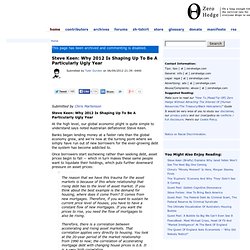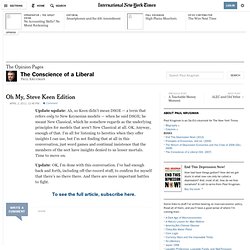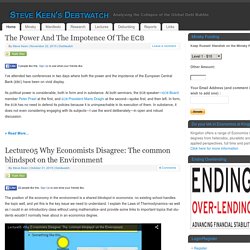

Steve Keen: Why 2012 Is Shaping Up To Be A Particularly Ugly Year. Submitted by Chris Martenson Steve Keen: Why 2012 Is Shaping Up To Be A Particularly Ugly Year At the high level, our global economic plight is quite simple to understand says noted Australian deflationist Steve Keen.

Banks began lending money at a faster rate than the global economy grew, and we're now at the turning point where we simply have run out of new borrowers for the ever-growing debt the system has become addicted to. Once borrowers start eschewing rather than seeking debt, asset prices begin to fall -- which in turn makes these same people want to liquidate their holdings, which puts further downward pressure on asset prices: The reason that we have this trauma for the asset markets is because of this whole relationship that rising debt has to the level of asset market.
He sees all of the major countries of the world grappling with deflation now, and in many cases, focusing their efforts in exactly the wrong direction to address the root cause: Steve Keen On Europe's Delusion And Why The Entire World Is Turning Japanese. Oh My, Steve Keen Edition. Update update: Ah, so Keen didn’t mean DSGE — a term that refers only to New Keynesian models — when he said DSGE; he meant New Classical, which he somehow regards as the underlying principles for models that aren’t New Classical at all.

OK. Anyway, enough of that. I’m all for listening to heretics when they offer insights I can use, but I’m not finding that at all in this conversation, just word games and continual insistence that the members of the sect have insights denied to us lesser mortals. Time to move on. Update: OK, I’m done with this conversation. Oh dear. Firstly, there are similar underlying principles to the DSGE models that now dominate Neoclassical macroeconomics, and as with Ptolemaic Astronomy, these underlying principles clearly fail to describe the real world. What on earth? This is all in Eggertsson and Krugman, by the way. Steve Keen: Instability in Financial Markets 3/5. Steve Keen: Why 2012 is Shaping Up to be a Particularly Ugly Year. A Primer on Endogenous Money 1.
Steve Keen's Debtwatch. I’ve attended two conferences in two days where both the power and the impotence of the European Central Bank (EBC) have been on vivid display.

Its political power is considerable, both in form and in substance. At both seminars, the ECB speaker—ECB Board member Peter Praet at the first, and ECB President Mario Draghi at the second—spoke first, and then left. In form, the ECB has no need to defend its policies because it is unimpeachable in its execution of them. In substance, it does not even considering engaging with its subjects—I use the word deliberately—in open and robust discussion. The position of the economy in the environment is a shared blindspot in economics: no existing school handles the topic well, and yet this is the key issue we need to understand.
Click here for the Powerpoint slides. Permanent link to this post (73 words, estimated 18 secs reading time) Click here to download the Powerpoint slides. BBC Radio 4 - Today, 11/06/2012. BBC Radio 4 - In Business, Growing Pains. Keynes v Hayek: Two economic giants go head to head. Interesting Radio4 discussion on Economics & Society [Archive] Zed Books: Steve Keen on BBC Radio 4: Why Economics Is Bunk . Steve Keen.
Steve Keen (born 28 March 1953) is a former professor in economics and finance who taught at the University of Western Sydney.

He considers himself a post-Keynesian, criticizing neoclassical economics as inconsistent, unscientific and empirically unsupported. The major influences on Keen's thinking about economics include John Maynard Keynes, Hyman Minsky, Piero Sraffa, Joseph Alois Schumpeter, and François Quesnay. He also gives credit to Marx for contributing to the "financial instability hypothesis" of Hyman Minsky.[1] His recent work mostly concentrates on mathematical modeling and simulation of financial instability. He is a Fellow at the Centre for Policy Development. Early life and education[edit] Keen was born in Sydney in 1953. In 1990, he completed a Master of Commerce with Honours in Economics and Economic History at the University of New South Wales. Financial instability and debt deflation[edit] Debunking Economics[edit] Critique of neoclassical theory of the firm[edit]